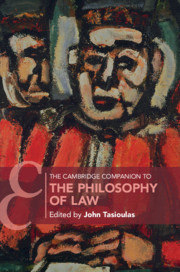Book contents
- The Cambridge Companion to the Philosophy of Law
- Cambridge Companions to Law
- The Cambridge Companion to the Philosophy of Law
- Copyright page
- Dedication
- Contents
- Contributors
- Introduction
- Part I General Theory
- Part II Values
- 6 The Rule of Law
- 7 Justice without Ethics: A Twentieth-Century Innovation?
- 8 Rights and Human Rights
- 9 Equality and Discrimination
- 10 Authority and Legitimacy
- 11 The Ends and Limits of Law
- Part III Special Theory
- Index
9 - Equality and Discrimination
from Part II - Values
Published online by Cambridge University Press: 15 June 2020
- The Cambridge Companion to the Philosophy of Law
- Cambridge Companions to Law
- The Cambridge Companion to the Philosophy of Law
- Copyright page
- Dedication
- Contents
- Contributors
- Introduction
- Part I General Theory
- Part II Values
- 6 The Rule of Law
- 7 Justice without Ethics: A Twentieth-Century Innovation?
- 8 Rights and Human Rights
- 9 Equality and Discrimination
- 10 Authority and Legitimacy
- 11 The Ends and Limits of Law
- Part III Special Theory
- Index
Summary
Ever since the publication of John Rawls’ A Theory of Justice in 1971, Anglo-American philosophers have discussed the nature of equality and its place in a theory of distributive justice.1 They have asked whether it is equality per se that is valuable, or priority for those who are worst off, or perhaps sufficiency – that is, ensuring that each person has enough.2 They have also asked about the ‘currency’ of egalitarian justice: what is it that should be distributed equally? Is it welfare, resources, opportunities, or perhaps what Amartya Sen called ‘capabilities’?3 In response, philosophers such as Elizabeth Anderson, Samuel Scheffler and Joshua Cohen have argued that it is a mistake to think of the value of equality solely in distributive terms.4 Rather, within a democratic society, we need to aim at relational equality – that is, relationships of equal status, in which no one is unfairly subordinated to others. Relational equality requires the redistribution of certain goods; so it is not unrelated to distributive equality. But from the standpoint of relational equality, particular distributive goals matter only insofar as they help us achieve a society in which no one is relegated to the status of a second-class citizen. And to achieve such a society, we need to pay particular attention not just to how various goods are distributed, but also to inappropriate expressions of deference toward certain groups and censure of others, and to policies and structures that inadvertently leave certain groups unable to see themselves as full and equal participants in society.
- Type
- Chapter
- Information
- The Cambridge Companion to the Philosophy of Law , pp. 171 - 190Publisher: Cambridge University PressPrint publication year: 2020



